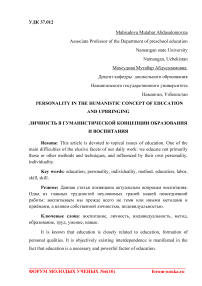Personality in the humanistic concept of education and upbringing
Автор: Mahsudova M.A.
Журнал: Форум молодых ученых @forum-nauka
Статья в выпуске: 6 (10), 2017 года.
Бесплатный доступ
Resume: This article is devoted to topical issues of education. One of the main difficulties of the elusive facets of our daily work: we educate not primarily those or other methods and techniques, and influenced by their own personality, individuality.
Education, personality, individuality, method, labor, skill
Короткий адрес: https://sciup.org/140279055
IDR: 140279055
Текст научной статьи Personality in the humanistic concept of education and upbringing
It is known that education is closely related to education, formation of personal qualities. It is objectively existing interdependence is manifested in the fact that education is a necessary and powerful factor of education.
Education - process and result of learning systematic knowledge, skills and abilities. In the process of education is transmitted from generation to generation the knowledge of all the spiritual wealth created by mankind, the assimilation of the results of public historical knowledge is reflected in science and nature, technology and art, as well as employable skills.
Education is a necessary condition for preparation for life and work, the main means of attaching the person to the culture and mastering it, the Foundation of cultural development.
The main way of education – teaching in various educational institutions. A significant role in the development of man, also play a self-education, cultural-educational work, participation in social activity.
The content of education, its level is determined by the requirements of social production is conditioned by the social relations and level of development of school and pedagogical science.
In close connection with the content of education is the learning which implemented the goals of education. The purpose and character of education have a great influence on teaching methods.
The widespread use of modern technical means and methods of independent cognitive activity determines the effectiveness of training. Personality – the public and scientific term denoting:
-
1. The human individual as a subject of relations and conscious activity (the person in the broad sense of the word) or
-
2. A stable system of socially significant features that characterize an individual as a member of a society or community.
The problem of identity in philosophy is, first of all, the question of the place of man in the world, not only than he actually is and how one can become that is, can man become the master of fate, can he "make" himself to create his own life.
So we found out what education is and what a personality. Find out what does the personality in the humanistic concept of education and upbringing.
Some asked the great Avicenna:
-
- At what age to start raising a child?
He asked in response:
How old is your child?
-
- One month.
-
- Avicenna said:
-
- You are already late by one month.
One of the main difficulties of the elusive facets of our daily work: we educate not primarily those or other methods and techniques, and influence of self, of individuality. Without spiritualizing of a living thought and passion of the teacher, the method will remain a dead circuit. For the moment the little man took the first step on earth, he begins to compare himself with those who are raising him, makes his demands, puts him in his spiritual powers, he wants to see in him their ideal.
The idea that in the process of education the person we educate, beginning refers to himself as a person is very important. Attitude to yourself, as a person is a feature of the spiritual life ultimately characterizes and determines the level of culture of the pedagogical process. Only under the condition that the teacher taught their students about yourself, it creates psychological and moral preconditions that in daily practice called the influence of the collective on the individual.
The staff is a very sensitive tool that creates music education required to influence the soul of each pupil works only when the tool is configured. And configured it only to the personality of the teacher, educator: precisely configured it how I look, how I look at it the pupils of the teacher as a person, what do they see and open.
The force that encourages each pupil to look at himself, reflect on their own behavior, to control themselves – and that, in essence begins the real education is the personality of an educator of his ideological beliefs, the richness of its spiritual life. To teach the pupil to treat yourself as a person - it means to have a commitment to self-education, to approve in it the strength of will necessary for self-organization. In the collective man shows himself in relation to others and to himself.
The attitude of pupils towards the personality of a teacher can be described as: the identity of the teacher that attracts, delights, inspires pupils value, beauty, and ideological Outlook on life, moral and ethical principles. If you want to be a powerful force affecting the team, be for the pupils of the Apostle of truth and science.
Conclusions: According to the humanistic approach, education aims at the formation of the basic culture of personality, which is the basis for definitions and descriptions of the content of education and includes a set of "cultures": the culture of life, educational and professional self-determination, political and legal culture, economic and labour culture, intellectual, moral, artistic, physical, and culture family relations and communication.
Список литературы Personality in the humanistic concept of education and upbringing
- Great Soviet encyclopedia, 1981
- G. B. Baryshnikova.Theory and methodology of upbringing student. 2006
- Monography. Chebotkova.Golovchanskaya.2010 G.


